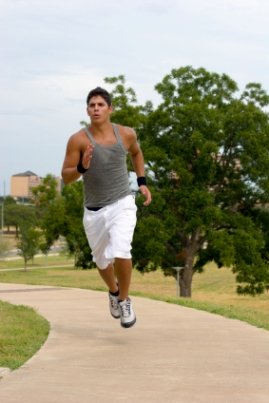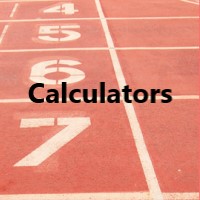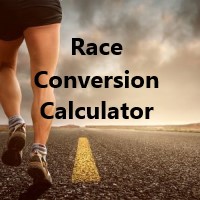Race Conversion Calculator
The Running Calculator You Need To Really Understand Your Running Abilities
Use this running calculator if you want to know how well you could do in one race, based on the results of another race. Just make sure you take in the information that is provided after this calculator. It is important.
Background Behind the Race Conversion Calculator

Results of this running calculator are often surprisingly accurate.
However....
This running calculator tells you how fast you can run in another race, given you put in the needed training.
By the way, the formula used by Riegel is the following:
Where:
D1 = Distance previous race
D2 = Distance next race
T1 = Time run in previous race
T2 = Predicted time for next race
Just in case you needed to know... :)
How NOT to Use the Race Conversion Calculator

This guy is flying now, but will he finish strong?
How you use this race conversion calculator is important. As said in the previous paragraph, you need to still put in the required training.
You can get into trouble in a few ways with this calculator:
Relying on race experiences from too long ago
For optimal use of this calculator you will want to use very recent race experiences. Ideal is when you are doing a "tune-up" race 2-4 weeks before your goal race, then plug in the results of the tune-up race to work out how fast you'd be able to do your goal race. Don't use a race you have done ages ago, it will just not be useful.
Relying on races that are too short
You may be preparing for a half marathon or marathon. I'd really advise you to use a 10k or 15k as a tune-up race for the half marathon. And use a half marathon as a tune-up race for the full marathon.
You really can't get away with a very fast two mile or 5k result and use it as a gauge for your half marathon or marathon performance. Those races are just too dissimilar in nature.
Not backing it up with the right training
Don't expect to be able to run a marathon within three hours, just because you can run a 10K in 38 minutes. The calculator merely tells you it is within your ability to run this fast.
The right marathon training includes a lot of long, long runs and mid-week runs of 90 minutes or more as well.
When you haven't done sufficient marathon training, you will feel the consequences of that in between the 20 and 26.2 mile mark. Don't you worry about that... :)
So, back it up with the right training.
How to Use the Race Conversion Calculator
A way to use this calculator is to work out how fast you'll have to be able to run in shorter races in order to be able to achieve certain goals in longer races.E.g. suppose you'll want to be able to do a half marathon in 90 minutes. Now, playing around with the above race conversion calculator you'll find that a 10k in 40 - 40:30 minutes is equivalent to a sub-90 half marathon.
So, a first goal may be to crack 40 minutes in the 10k.
How I Use the Race Conversion Calculator
 I like to do one or two tune-up races before a
goal race.
I like to do one or two tune-up races before a
goal race. Then I use the race conversion calculator to provide an indication of how fast my goal race will be.
In addition to that I use a running pace calculator.
I do this to work out if my current running training pace is in line with the goal race pace.
In addition to that I also ask myself the question whether my training has been sufficient for the event.
Have I put in the right training?
Am I cheating myself into believing I am faster than I really am?
In addition to that I do some goal pace workouts.
That way, I get a few different pieces of information together to provide a better picture. Is the information al saying the same thing? What can I learn from it all? All together, this should help you determine a realistic (tough but doable) goal for your goal race.
The Importance of Your Running Base - The Common Problem of Race Misalignment

When looking at people's running performances, it is often clear that their base is not fully developed. How? Simple. When entering the times of the shorter race, it turns out that the longer race was run "too slow".
It is often even clearer when you have a few race results, say of a 5k, 10k and half marathon.
Your 5k result may be 20 minutes.
Your 10k result may be 43 minutes.
And your half marathon result may be 1hr 40 mins.
Based on your 5k, your 10k should be 41:40.
Based on your 5k, your half marathon should be just over 1 hr 32 mins.
Based on your 10k, your half marathon should be just under 1 hr 35 mins.
See what is happening? The 10k is too slow based on the 5k results. The half marathon is too slow based on the 5k and the 10k. And the half marathon based on the 10k is slower than the half marathon based on the 5k.
This is a very usual scenario. You may have the exact same issue. This occurs because you haven't fully developed your base yet. Because of that you get into trouble over longer distances. The stamina is simply not there to back the speed.
When your performances show this same kind of relation, the best remedy is to do more base running.
Check out that link to learn more about developing your base.
In summary, this is a really good running calculator to use. But you need to be careful when using it to predict how fast you will run.
Use the race conversion calculator as a gauge of your abilities not necessarily as the goal time for your next race.
Use some other bits of information and a bit of common sense and you'll be able to work out the right pace for your next goal race.
Home > Running Calculators > Race Conversion Calculator
Home > Running Training > Race Conversion Calculator
Home > Running Training > Race Conversion Calculator










